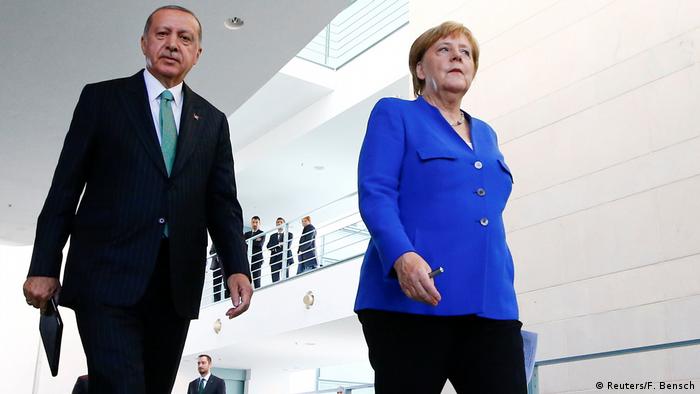No, it is not a state visit like any other. This was clear from the outset and it shows in every Minute. Ben Knight experienced in Berlin, a German Chancellor and a President in crisis mode.

At the Meeting with German Chancellor Angela Merkel in Berlin, Turkish President Recep Tayyip Erdogan had to endure criticism – especially when it comes to freedom of the press. It was “important to stay in conversation” when there are differences, said Angela Merkel on the much-anticipated press conference, which had begun with delay. According to the report, Erdogan had threatened to cancel it, if the Turkish Journalist Can Dündar would participate. Dündar lives in exile in Germany, Turkey calls for his extradition.
At the joint press conference of Erdogan and Merkel, there was an incident: A protester in a T-Shirt with the inscription “press freedom for journalists in Turkey” has been removed from the security forces out of the hall while the two leaders looked at each other and tense effect. Later it became known that it was the Turkish journalist Adil Yigit, head of Hamburg from the Online news portal “Avrupa Postasi”.

Protest at the press conference in Berlin
Merkel was under pressure, in the face of an increasingly authoritarian course in Turkey, the human rights situation in Turkey. You mentioned in Turkey detained a German citizen already in their Declaration at the beginning of the press conference: “I have urged that these cases can be resolved quickly.”
Erdogan: respect for the Turkish justice
The President of Turkey showed itself to be unmoved by the criticism and urged respect for the Turkish justice system. The Chancellor underlined the importance of good German-Turkish relations: “Germany has an interest in an economically stable Turkey,” she said at the joint press conference.
The bilateral relations have reacted worse in the past two years, after Ankara with tough measures – including the detention of journalists, officers and officials, were among several German citizens – on the failed coup attempt in the summer of 2016.
The Pro-government Turkish newspaper “Yeni Asir” reported on Friday that Turkey had requested before the visit of Erdogan in Germany, the extradition of the journalist Can Dündar. There is a so-called “terror list” with the names of 69 persons, whose extradition is demanded Ankara. Such a step would promote “peace and security in the two countries,” Erdogan said on Friday in Berlin.
Watch the Video 01:58 live Now 01:58 Min. 
Erdogan’s arrival in Berlin
Send Facebook Twitter google+ Tumblr VZ Mr. Wong Xing Newsvine Digg
Permalink https://p.dw.com/p/35bdQ
Erdogan in Berlin – forked receiving
Can Dündar stay out of the press occurs
Can Dündar, the former editor-in-chief of the newspaper “Cumhuriyet”, lives for more than two years in exile in Germany. In Turkey, he was convicted because of an article on arms deliveries to Syria, to imprisonment. The Erdogan-critical Journalist was accredited for the press conference in Berlin, however, he announced shortly before its start, but not to participate. A media report says that Erdogan had threatened before the press conference, cancel, should, Can participate in Dündar. “The decision that Mr Dündar does not participate in the press conference, he personally met”, stressed the Chancellor.
Erdogan described the journalists as “an agent that has published state secrets” and sentenced to more than five years in prison. It’s going to be a “crime” as in all other countries.
According to a report in the “newspaper” was involved in the Turkish Embassy to the admission of Turkish journalists to the press conference. The Turkish Reporter Aziz Kocyigit from the left-wing Turkish newspaper “Evrensel” said the “daily newspaper”, I referred to the press service of the Federal him to the Embassy. The Federal press service of the voice of “internationally practiced Standards”: the accreditation process itself, the Turkish Embassy was not entitled to decide, at the press conference in the Chancellery, but “due to spatial conditions to an authorisation limit”, in such cases, you drive a two-pronged approach, quoted by the news Agency EPD. The Chairman of the Association of foreign press in Germany, Pascal Thibaut, said he had never heard of it, that messages, decided which journalists would be admitted to press conferences.